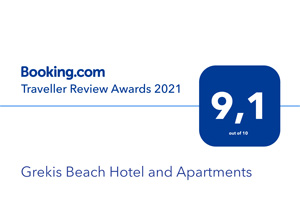A drop of land, between the sea and the sky, resembling to both a cape and an island, an emerald dressed in white, totally absorbed in reflecting its own glory and torchlight procession.
Rio, Assini, Aepeia, Koroni. Four names that have shed their light onto this peninsula since four thousand years ago. Just a tiny piece of earth that has a lot to tell us: times of prosperity, fall, celebration and lamentation.
Nature and time have created a divine picture, as if they wished to honor centuries of history whereas each part of this picture assumes qualities of the human body, soul, spirit and character.
Seems like the grand old lady is now resting, somehow jammed upon its castle’s inclines, while musing aquamarine and silver charms, or contemplating countless crossings lost in the wave.
Now, with its golden beaches gifts to thousands of tourists – pilgrims the most carefree vacation one can find. The entrance to Koroni Kakoskali, is the first, while entering the town, neighborhood of Koroni.
On the left, the Messinian gulf, within and idyllic blue background, and on the right the “Tourlakou” hill, the lucky eternal spectator onto its natural balcony. The narrow road is descending, bordered by old mansions and shops, and soon the visitor is wondering whether he should continue straight ahead or will he climb up the picturesque little stairs.
Nevertheless, Koroni is openheartedly waiting for you as if you were to be honored. Stepping down the cobbled wide paved little stairs, with recently planted small trees you are brought to, just to the left, in front of Karapavlos’, the chieftain’s, mansion.
The small but lively road meets the traditional central square, which is also the town’s market.
The St. Demetrios Metropolitan Church is fitting, a basilica of the Ionian Islands’ art, which was built in 1864. The clock is a donation of Moudakis in 1909. *
Source: www.messinia-guide.gr





